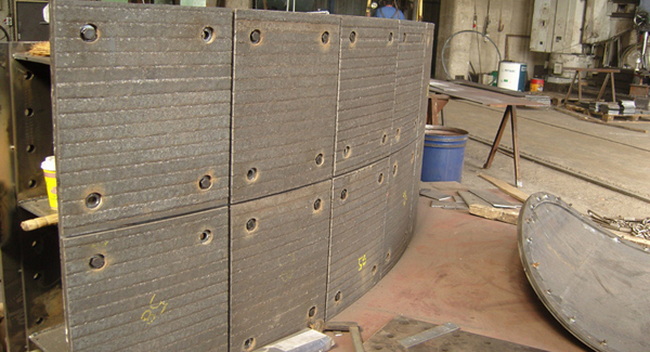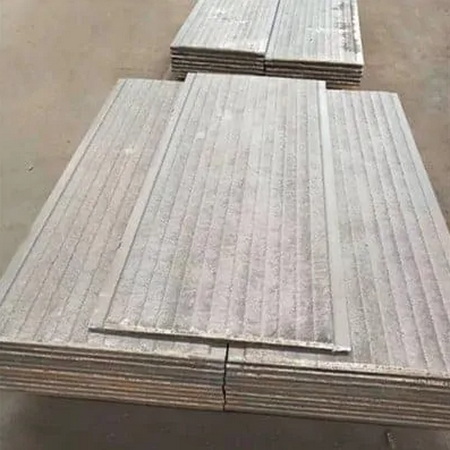Content Menu
● Material Quality
● Thickness and Size
● Wear Resistance
● Cost and Budget
● Supplier Reputation
● Compatibility with Equipment
● Environmental Considerations
● Lead Time and Availability
● Conclusion
● Frequently Asked Questions
>> 1. What is the primary use of chromium carbide plates?
>> 2. How do I determine the right thickness for my application?
>> 3. Can I order custom-sized chromium carbide plates?
>> 4. What is the typical hardness rating for chromium carbide plates?
>> 5. How can I ensure I am purchasing from a reputable supplier?
When it comes to industrial applications, chromium carbide plates are renowned for their exceptional wear resistance and durability. These plates are commonly used in environments where high abrasion and impact are prevalent, such as mining, construction, and manufacturing. However, purchasing chromium carbide plates requires careful consideration of several factors to ensure you select the right product for your specific needs. This article will explore the key factors to consider when buying chromium carbide plates, providing insights to help you make an informed decision.

Material Quality
The quality of the chromium carbide plate is paramount. High-quality plates are made from premium materials that ensure longevity and performance. When evaluating material quality, consider the following aspects:
- Composition: Chromium carbide plates typically consist of a mixture of chromium and carbon. The ratio of these elements can significantly affect the plate's hardness and wear resistance. Look for plates with a high chromium content, as this enhances their durability.
- Manufacturing Process: The method used to manufacture the plates can influence their quality. Plates produced through advanced techniques, such as hot pressing or sintering, tend to have better structural integrity and performance characteristics. These processes help in achieving a uniform distribution of carbide particles, which is crucial for the plate's overall performance.
- Certifications: Check if the manufacturer provides certifications for their products. Certifications can indicate that the plates meet specific industry standards for quality and performance. Look for ISO certifications or other relevant industry standards that ensure the product's reliability.
Thickness and Size
The thickness and size of the chromium carbide plates are crucial factors that depend on the intended application. Here are some considerations:
- Application Requirements: Different applications may require different thicknesses. For instance, heavy-duty applications may necessitate thicker plates to withstand greater wear and impact. Understanding the specific demands of your application will guide you in selecting the appropriate thickness.
- Custom Sizes: Some manufacturers offer custom sizes to fit specific machinery or equipment. If you have unique requirements, inquire about the possibility of ordering custom-sized plates. Customization can help optimize the performance of the plates in your specific application.
- Weight Considerations: Keep in mind that thicker plates will be heavier, which may affect transportation and installation. Ensure that the weight of the plates is manageable for your operations. Consider the logistics involved in handling and installing the plates, especially in large-scale projects.
Wear Resistance
One of the primary reasons for purchasing chromium carbide plates is their wear resistance. When evaluating wear resistance, consider the following:
- Hardness Rating: The hardness of chromium carbide plates is typically measured on the Rockwell scale. A higher hardness rating indicates better wear resistance. Look for plates with a hardness rating of at least 60 HRC for optimal performance. This level of hardness ensures that the plates can withstand abrasive materials without significant degradation.
- Testing and Performance Data: Request performance data or testing results from the manufacturer. This information can provide insights into how the plates perform under specific conditions and help you gauge their wear resistance. Manufacturers may conduct standardized tests to demonstrate the durability of their products.
Cost and Budget
While quality is essential, cost is also a significant factor in purchasing decisions. Here are some tips for managing costs:
- Compare Prices: Obtain quotes from multiple suppliers to compare prices. However, be cautious of extremely low prices, as they may indicate inferior quality. A thorough comparison will help you identify the best value for your investment.
- Total Cost of Ownership: Consider the total cost of ownership, which includes not only the initial purchase price but also maintenance, replacement, and operational costs over time. Investing in higher-quality plates may lead to lower overall costs due to reduced wear and longer lifespan. This approach can save you money in the long run.
- Bulk Purchasing: If you require a large quantity of plates, inquire about bulk purchasing discounts. Many manufacturers offer reduced prices for larger orders. This can be a cost-effective strategy for businesses with ongoing needs for chromium carbide plates.
Supplier Reputation
The reputation of the supplier is a critical factor in ensuring you receive high-quality products. Consider the following:
- Experience and Expertise: Look for suppliers with a proven track record in the industry. Experienced suppliers are more likely to provide reliable products and support. Their expertise can also be beneficial in guiding you through the selection process.
- Customer Reviews and Testimonials: Research customer reviews and testimonials to gauge the satisfaction of previous buyers. Positive feedback can indicate a reputable supplier. Look for reviews that specifically mention the quality of the plates and the level of customer service provided.
- After-Sales Support: Inquire about the supplier's after-sales support. A good supplier should offer assistance with installation, maintenance, and any issues that may arise after the purchase. Reliable support can enhance your overall experience and ensure that you get the most out of your investment.

Compatibility with Equipment
Ensure that the chromium carbide plates you choose are compatible with your existing equipment. Consider the following:
- Machinery Specifications: Check the specifications of your machinery to determine the required dimensions and thickness of the plates. Compatibility is crucial for optimal performance and safety.
- Installation Requirements: Some plates may require specific installation techniques or equipment. Ensure that you have the necessary tools and expertise for proper installation. Proper installation is essential to maximize the effectiveness of the plates.
Environmental Considerations
Depending on your industry, environmental factors may play a role in your decision-making process. Consider the following:
- Operating Conditions: Evaluate the operating conditions where the plates will be used. Extreme temperatures, humidity, or exposure to chemicals can affect the performance of the plates. Understanding these conditions will help you select the right product.
- Sustainability: If sustainability is a priority for your organization, inquire about the environmental impact of the manufacturing process and the materials used in the plates. Many manufacturers are now focusing on sustainable practices, which can align with your company's values.
Lead Time and Availability
Finally, consider the lead time and availability of the chromium carbide plates. Factors to keep in mind include:
- Production Time: Inquire about the production time for the plates. If you have urgent needs, ensure that the supplier can meet your timeline. Timely delivery is crucial for maintaining your project schedules.
- Stock Availability: Check if the supplier has the plates in stock or if they will need to be manufactured. Delays in production can impact your operations. Having a reliable supplier with good stock levels can prevent potential disruptions.
Conclusion
Purchasing chromium carbide plates is a significant investment that requires careful consideration of various factors. By evaluating material quality, thickness, wear resistance, cost, supplier reputation, compatibility, environmental considerations, and lead time, you can make an informed decision that meets your specific needs. Remember that investing in high-quality plates can lead to improved performance and reduced operational costs in the long run.

Frequently Asked Questions
1. What is the primary use of chromium carbide plates?
Chromium carbide plates are primarily used in industries that require high wear resistance, such as mining, construction, and manufacturing. Their durability makes them ideal for applications involving abrasive materials.
2. How do I determine the right thickness for my application?
The right thickness depends on the specific application and the level of wear and impact expected. Consult with industry experts or suppliers for guidance on selecting the appropriate thickness based on your operational needs.
3. Can I order custom-sized chromium carbide plates?
Yes, many manufacturers offer custom sizes to fit specific machinery or equipment requirements. Customization can help optimize the performance of the plates in your specific application.
4. What is the typical hardness rating for chromium carbide plates?
A hardness rating of at least 60 HRC is recommended for optimal wear resistance. This level of hardness ensures that the plates can withstand abrasive materials without significant degradation.
5. How can I ensure I am purchasing from a reputable supplier?
Research the supplier's experience, customer reviews, and after-sales support to gauge their reputation in the industry. A reputable supplier will have a history of providing quality products and reliable customer service.
















